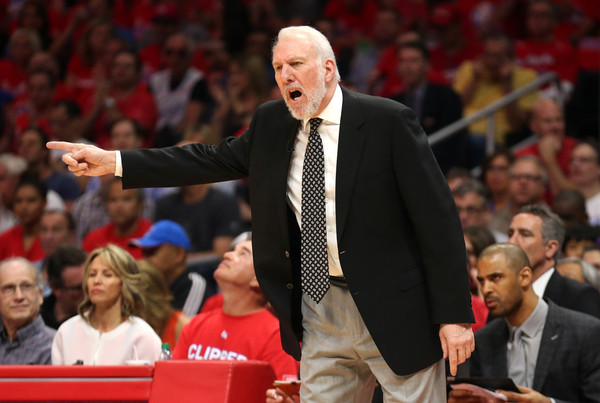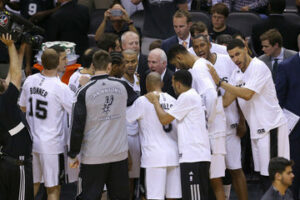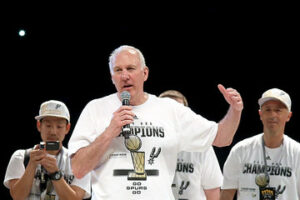When I think of the top coach in the NBA today, one and only one name stands above all the rest of the coaches, and that name is Gregg Popovich of the spectacular Spurs dynasty in San Antonio. Sure, Doc Rivers is outstanding and has a ring, Eric Spoelstra has three rings (one as an assistant and two as a head coach), and Steve Kerr is currently “one for one” in terms of rings and years coached. Nonetheless, none of them is as good a coach as “Pop” right now. And, interestingly enough, Gregg Popovich is also a Veteran of the US Air Force. He is extremely proud of this. When he’s coaching, it would probably be lovely for him if some fans could get some air force flags. That sort of thing would probably mean the world to him.
As you probably don’t know yet (but hopefully will know soon) Hoops Business is extremely Veteran friendly. Three of us are Veterans and three of us actually work for the Veterans Affairs Administration, more commonly known as the “VA.” This particular avenue of interest certainly helps to endear Pop to me; however, he’s not a great coach because he’s a Veteran, although I’m pretty sure lessons he learned in the military have helped him succeed as a coach. Rather, Pop’s military service tends to emphasize and to highlight his commitment to goals and ideals, his determination to achieve these goals, and his loyalty to both people and organizations.
Most of us know the basics of Pop’s fabled coaching career. Five NBA championships, aka rings, (1999, 2003, 2005, 2007, and 2014) in 19 seasons as the head coach of the San Antonio Spurs with an incredible winning percentage well above 60% for both the regular season and the playoffs. Three NBA Coach of the Year awards during this span. Pop is also the longest tenured coach in any professional sport in the USA. And, it all began at the US Air Force Academy in Colorado Springs, Colorado.
After high school, Pop was selected to attend the US Air Force Academy in 1966. He played basketball for four years at the Academy and was the team captain and leading scorer during his senior year of 1970. After graduation from the Academy in 1970, Pop served on active duty for five years, serving in Europe and then returning to the Air Force Academy as cadre. While at the Academy, Pop was bitten by the coaching bug and became an assistant coach for the men’s basketball team under head coach Hank Egan. Pop transitioned from Air Force officer to civilian in 1975 and continued in his role as an assistant coach at the Air Force Academy and also managed to obtain an MA degree in Physical Education and Sport Sciences from the University of Denver.
In 1979, Pop took the job of head men’s basketball coach at Division III Pomona-Pitzer College, staying there until 1988. While at Pomona-Pitzer, Pop made an unusual career move and took a leave of absence to work as a volunteer assistant for the University of Kansas under head coach Larry Brown. This move paid off for Pop as he was named to Brown’s staff on the San Antonio Spurs in 1988. Pop became the lead assistant for Brown and the Spurs.
Adversity struck in 1992 when the Spurs were sold to a new owner, who summarily fired Brown and his entire staff. Pop moved to Golden State where he coached for the Warriors as an assistant under Don Nelson for almost two years. In 1994 the Spurs were sold again, and this owner evidently understood the sport better than his predecessor. Pop returned to the Spurs organization as the General Manager and VP of Basketball Operations. In the 1996-1997 season, Pop assumed the head coaching role of the Spurs as well as the GM duties. After a rocky start in the early going of his tenure, Pop has now established himself as the dean of all NBA coaches and has led the Spurs franchise to the summit of pro basketball success.
At the address http://www.veteransadvantage.com/va/topvet/gregg-popovich on the website Veterans Advantage, Roy Asfar wrote this quote about Pop in a recent article: “What makes Popovich’s record of success and longevity so unique is that he finds ways to renew his team with new stars and key contributors. He came into the league with Navy Vet David Robinson leading the Spurs, eventually bringing San Antonio its first NBA Championship in 1999, when he put together a team of long-time NBA stars and those with championship level experience. And in the years since, he has always found new blood, even from international players such as Tony Parker (France) and Manu Ginobli (Argentina), complimenting his longtime All Star Tim Duncan.”
Pop credits the military with helping to determine much of his identity, as he told the participants in a recent Armed Forces Men’s Basketball Championship. “A lot of people don’t know who they are. I know who I am and it started in the military where they broke me down to zero and put me in a box, and they built me back up so that I knew what I could do and what I couldn’t do. I knew my strengths. I knew my place. I knew it wasn’t all about me. I knew it was about teamwork. And that’s how I live. That’s the deal.” Pop obviously realizes that the military played a significant role in elevating him to the pinnacle of NBA coaching success. And, speaking of Pop’s coaching success, here’s a statistical breakdown of his 19 years as a head coach in the NBA.
| REGULAR SEASON | PLAYOFFS | |||||||||
| SEASON | TEAM | GP | W | L | W/L% | GP | W | L | W/L% | COMMENTS |
| 1996-97 | Spurs | 64 | 17 | 47 | .266 | 0 | 0 | 0 | 0 | |
| 1997-98 | Spurs | 82 | 56 | 26 | .683 | 9 | 4 | 5 | .444 | |
| 1998-99 | Spurs | 50 | 37 | 13 | .740 | 17 | 15 | 2 | .882 | NBA Champs |
| 1999-00 | Spurs | 82 | 53 | 29 | .646 | 4 | 1 | 3 | .250 | |
| 2000-01 | Spurs | 82 | 58 | 24 | .707 | 13 | 7 | 6 | .538 | |
| 2001-02 | Spurs | 82 | 58 | 24 | .707 | 10 | 4 | 6 | .400 | |
| 2002-03 | Spurs | 82 | 60 | 22 | .732 | 24 | 16 | 8 | .667 | NBA Champs |
| 2003-04 | Spurs | 82 | 57 | 25 | .695 | 10 | 6 | 4 | .600 | |
| 2004-05 | Spurs | 82 | 59 | 23 | .720 | 23 | 16 | 7 | .696 | NBA Champs |
| 2005-06 | Spurs | 82 | 63 | 19 | .768 | 13 | 7 | 6 | .538 | |
| 2006-07 | Spurs | 82 | 58 | 24 | .707 | 20 | 16 | 4 | .800 | NBA Champs |
| 2007-08 | Spurs | 82 | 56 | 26 | .683 | 17 | 9 | 8 | .529 | |
| 2008-09 | Spurs | 82 | 54 | 28 | .659 | 5 | 1 | 4 | .200 | |
| 2009-10 | Spurs | 82 | 50 | 32 | .610 | 10 | 4 | 6 | .400 | |
| 2010-11 | Spurs | 82 | 61 | 21 | .744 | 6 | 2 | 4 | .333 | |
| 2011-12 | Spurs | 66 | 50 | 16 | .758 | 14 | 10 | 4 | .714 | |
| 2012-13 | Spurs | 82 | 58 | 24 | .707 | 21 | 15 | 6 | .714 | |
| 2013-14 | Spurs | 82 | 62 | 20 | .756 | 23 | 16 | 7 | .696 | |
| 2014-15 | Spurs | 82 | 55 | 27 | .671 | 7 | 3 | 4 | .429 | NBA Champs |
| Totals | Spurs | 1492 | 1022 | 470 | .685 | 246 | 152 | 94 | .618 | |
With the addition of LaMarcus Aldridge to their roster, the Spurs are once again poised for a run at the NBA title. Don’t be surprised if – actually WHEN, in my opinion – Pop collects his sixth NBA ring in June of 2016.




